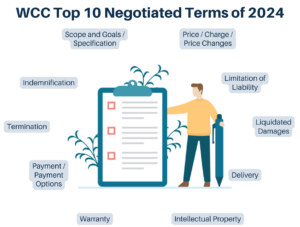Introduction
Understanding the importance of effective contract management is essential for general counsels. By tracking and analyzing key data points throughout the contract lifecycle, they can make informed decisions and drive optimal outcomes. In this article, we will explore the critical role of data points in contract management and discuss the benefits they offer to general counsels.
The power of data points in contract management
Data-Driven Decision-Making In today’s fast-paced business environment, data-driven decision-making has become increasingly important. General counsels can leverage contract data to inform their negotiation strategies and mitigate risks. By analyzing historical contract performance, they can gain insights into successful negotiation tactics, identify potential areas of improvement, and negotiate favorable terms. Data-driven decision-making allows general counsels to ensure contractual compliance, optimize resource allocation, and align contract outcomes with organizational goals.
Streamlining legal operations
Effective contract management requires streamlining legal operations. Tracking data points enables general counsels to optimize resource allocation and workflow efficiency. By monitoring metrics such as contract cycle time, deviation rates, and compliance data, general counsels can identify bottlenecks, streamline processes, and enhance overall operational efficiency. Additionally, data insights help improve vendor management by evaluating vendor performance, identifying potential risks, and negotiating better terms.
Essential data points to track in contract management
A. Contract milestones and expiration dates
Tracking contract milestones and expiration dates is crucial for ensuring timely actions and avoiding missed deadlines. General counsels can set reminders and implement notification systems to stay on top of critical contract events. By proactively managing contract timelines, they can avoid potential legal repercussions and maintain strong relationships with stakeholders.
B. Payment terms and financial obligations
Tracking payment terms and financial obligations is vital for financial planning and risk mitigation. General counsels can monitor payment milestones, invoice schedules, and compliance with contractual financial obligations. This enables them to identify potential financial risks, address payment discrepancies promptly, and ensure compliance with financial regulations.
C. KPIs for tracking data points in contract management
Monitoring performance metrics and key indicators provide insights into contract performance and adherence to predefined benchmarks. General counsels can track contract cycle time, deviation rates, and other performance indicators to evaluate the efficiency of contract management processes. By identifying areas for improvement, they can optimize workflows, streamline processes, and enhance overall contract performance.
D. Counterparty behavior and success rates
Analyzing historical data related to counterparty behavior and success rates empowers general counsels during contract negotiations. By understanding past outcomes and patterns, they can tailor their negotiation strategies, anticipate counterparty behavior, and negotiate more favorable terms. Data-driven insights enable general counsels to maximize value in negotiations, minimize risks, and achieve mutually beneficial outcomes.
E. Compliance metrics and regulatory requirements
Tracking compliance metrics and regulatory requirements is essential for legal risk management. General counsels must ensure that contracts adhere to legal and industry-specific regulations. By monitoring compliance metrics, they can identify potential compliance gaps, take corrective actions, and mitigate legal and reputational risks. Tracking regulatory changes and staying up to date with evolving requirements is also crucial.

Best Practices for effective data point tracking in contract management
A. Establishing a robust data management system
To effectively track contract data, general counsels should establish a robust data management system. This includes implementing a centralized contract repository and document management system. By organizing contracts and related documents in a secure and accessible manner, general counsels can ensure data accuracy, streamline information retrieval, and maintain compliance with data privacy regulations.
B. Automation and analytics
Leveraging technology solutions such as Volody’s AI-powered Contract Lifecycle Management (CLM) solution, general counsels can automate data-tracking processes and gain actionable insights. Volody’s advanced features enable efficient data capture, analysis, and reporting. Automation reduces manual effort, minimizes errors, and enhances data accuracy. Analytics capabilities provide visualizations and reports that empower general counsels to make data-driven decisions.
C. Regular audits and data validation
To maintain data integrity and quality, general counsels should conduct regular audits and data validation processes. Periodic reviews help identify data discrepancies, inaccuracies, or outdated information. By validating contract data against reliable sources and verifying its accuracy, general counsels can ensure the reliability of data-driven insights and decision-making.
Benefits of data point tracking in contract management
1. Enhanced decision-making
Tracking data points provides general counsels with actionable insights to make informed decisions. By analyzing contract data, they can identify trends, risks, and opportunities, enabling them to negotiate better terms, allocate resources effectively, and align contracts with organizational goals.
2. Risk mitigation
Data tracking enables general counsels to identify and mitigate potential risks. By monitoring compliance metrics, contractual milestones, and counterparty behavior, they can proactively address issues, ensure legal compliance, and minimize the likelihood of disputes or penalties.
3. Improved efficiency and productivity
Tracking contract data streamlines legal operations, leading to improved efficiency and productivity. By optimizing workflows, automating repetitive tasks, and leveraging analytics, general counsels can focus on strategic initiatives, reduce manual effort, and enhance overall performance.
4. Cost savings
Effective data tracking helps in cost management. By identifying opportunities for cost optimization, monitoring payment terms, and managing contract timelines, general counsels can avoid financial penalties, negotiate favorable terms, and make informed budgetary decisions.
Unlocking the value of data points: Volody’s AI-powered contract lifecycle management solution
Volody is a leading provider of AI-powered CLM solutions designed to empower general counsels and legal professionals. With its user-friendly interface and advanced features, it streamlines the contract management process, centralizes data, and enhances data-driven decision-making.
Volody’s AI CLM simplifies data tracking by automating the collection, organization, and analysis of contract data. Its AI capabilities extract key data points, track contract milestones, monitor payment terms, and provide real-time insights. By integrating with existing systems, Volody’s software ensures seamless data synchronization and offers a comprehensive view of contracts and associated information.
Volody has helped numerous organizations transform their contract management processes and achieve significant results. Testimonials from satisfied clients highlight Volody’s ability to streamline operations, reduce risk, and drive efficiency through effective data tracking and management.
FAQ: Frequently asked questions for data points in contract management
Q1. What are the key benefits of tracking data points in contract management?
Tracking data points enables informed decision-making, risk mitigation, improved efficiency, productivity, and cost savings in contract management processes.
Q2. How can data tracking help in negotiation strategies?
By analyzing historical data on counterparty behavior, success rates, and performance metrics, general counsels can tailor negotiation strategies, anticipate counterparty behavior, and negotiate favorable terms.
Q3. How does data tracking contribute to legal compliance?
Monitoring compliance metrics and contractual milestones helps general counsels ensure adherence to regulations, mitigate legal risks and maintain a compliant environment.
Q4. Can data tracking improve operational efficiency?
Yes, by tracking contract cycle time, resource allocation, and compliance metrics, general counsels can identify bottlenecks, optimize workflows, and enhance operational efficiency.
Q5. What role does data tracking play in risk management?
Tracking data points allows general counsels to proactively identify and mitigate potential risks by monitoring compliance, contractual milestones, and financial obligations.
Conclusion
Tracking essential data points in contract management empowers general counsels to optimize negotiation strategies, ensure compliance, and drive favorable outcomes. By leveraging advanced technology solutions like Volody’s AI-powered CLM solution, general counsels can automate data tracking processes and gain valuable insights for effective contract management. Embracing data-driven practices enhances legal operations, mitigates risks, and contributes to the overall success of an organization’s contract management endeavors.





